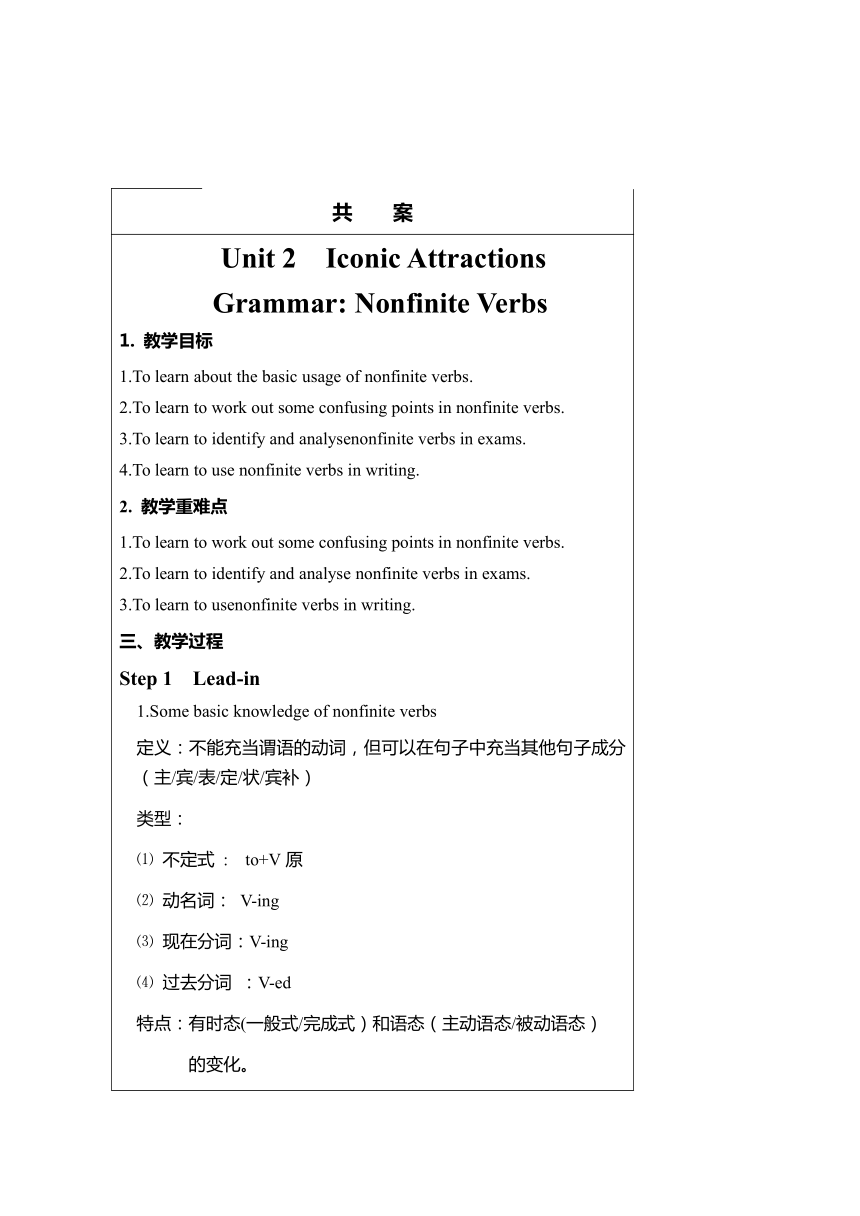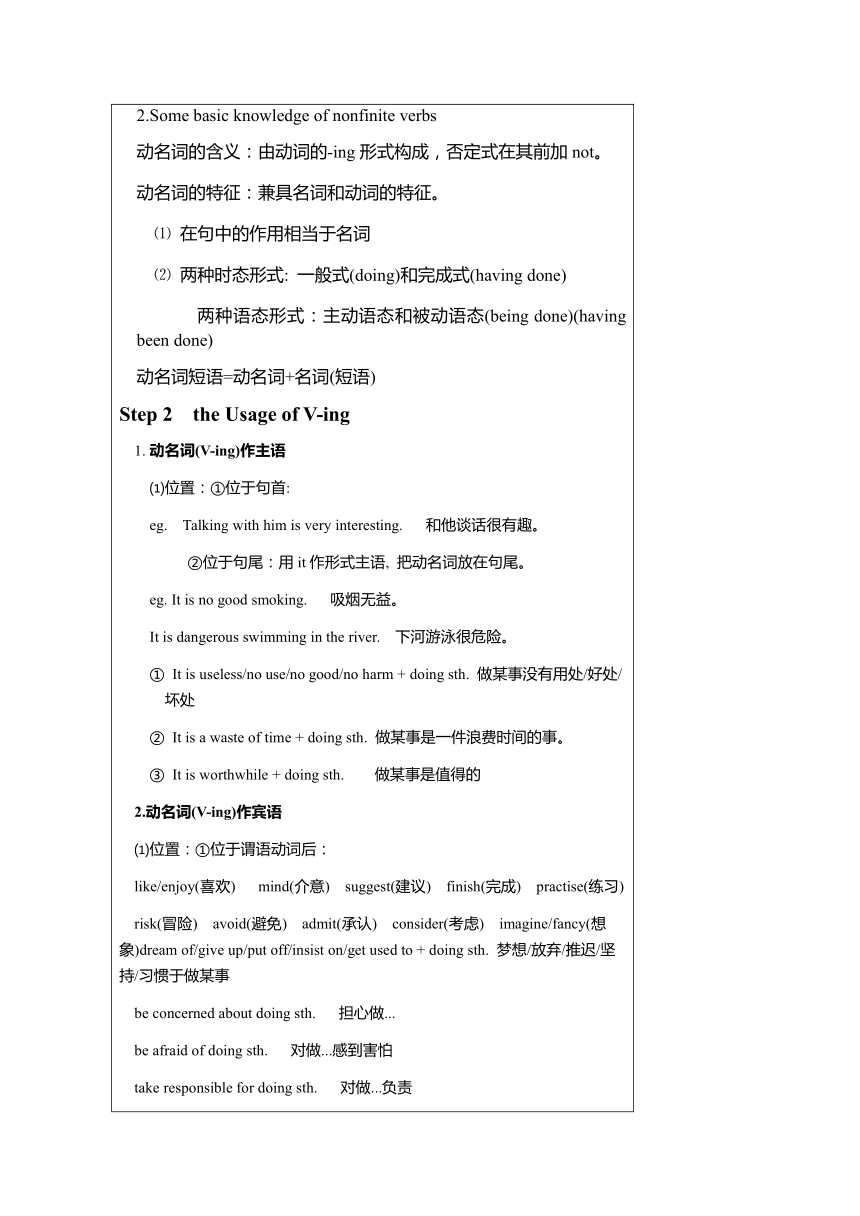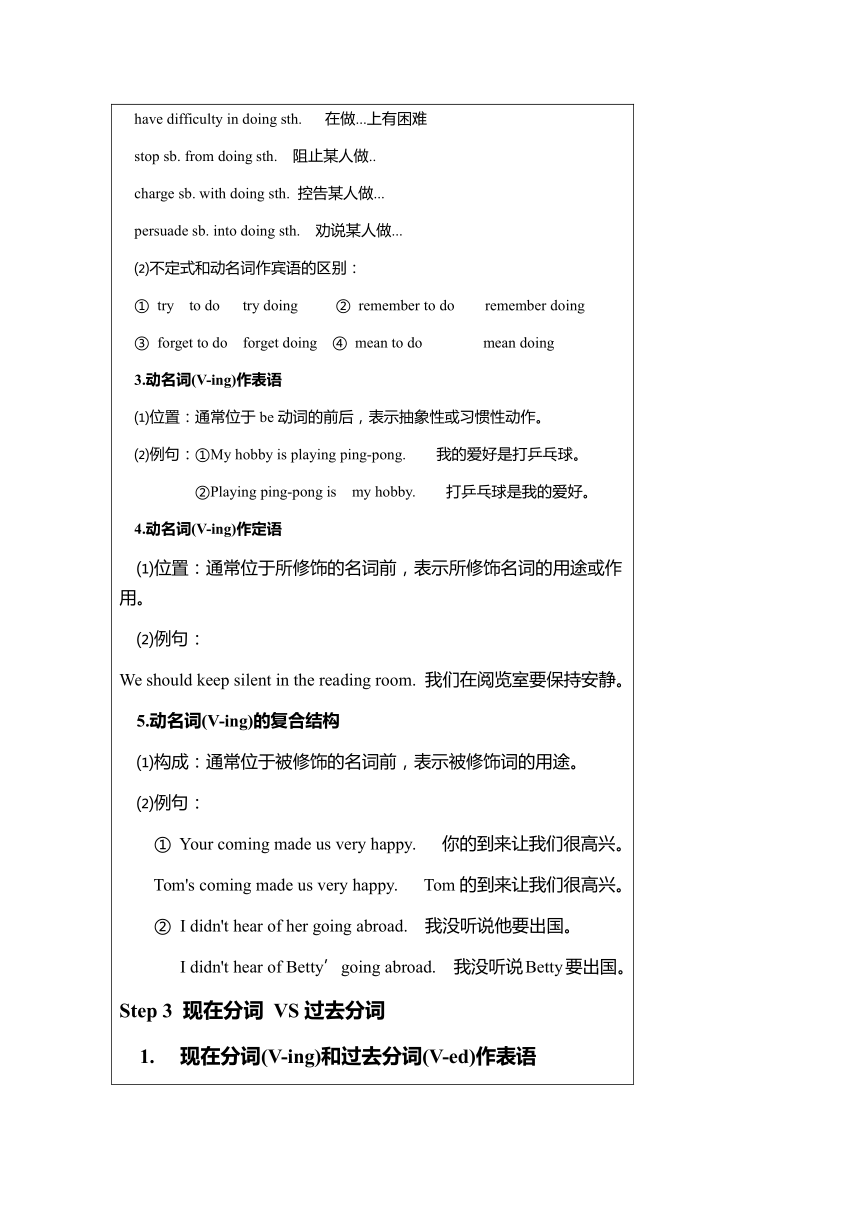人教版(2019)英语选择性必修第四册Unit 2 Iconic Attractions 语法 教案
文档属性
| 名称 | 人教版(2019)英语选择性必修第四册Unit 2 Iconic Attractions 语法 教案 |

|
|
| 格式 | zip | ||
| 文件大小 | 23.9KB | ||
| 资源类型 | 教案 | ||
| 版本资源 | 人教版(2019) | ||
| 科目 | 英语 | ||
| 更新时间 | 2022-04-22 23:07:06 | ||
图片预览



文档简介
共 案
Unit 2 Iconic Attractions Grammar: Nonfinite Verbs 教学目标 1.To learn about the basic usage of nonfinite verbs. 2.To learn to work out some confusing points in nonfinite verbs. 3.To learn to identify and analysenonfinite verbs in exams. 4.To learn to use nonfinite verbs in writing. 2. 教学重难点 1.To learn to work out some confusing points in nonfinite verbs. 2.To learn to identify and analyse nonfinite verbs in exams. 3.To learn to usenonfinite verbs in writing. 三、教学过程 Step 1 Lead-in 1.Some basic knowledge of nonfinite verbs 定义:不能充当谓语的动词,但可以在句子中充当其他句子成分(主/宾/表/定/状/宾补) 类型: ⑴ 不定式 : to+V原 ⑵ 动名词: V-ing ⑶ 现在分词:V-ing ⑷ 过去分词 :V-ed 特点:有时态(一般式/完成式)和语态(主动语态/被动语态) 的变化。 2.Some basic knowledge of nonfinite verbs 动名词的含义:由动词的-ing形式构成,否定式在其前加not。 动名词的特征:兼具名词和动词的特征。 ⑴ 在句中的作用相当于名词 ⑵ 两种时态形式: 一般式(doing)和完成式(having done) 两种语态形式:主动语态和被动语态(being done)(having been done) 动名词短语=动名词+名词(短语) Step 2 the Usage of V-ing 动名词(V-ing)作主语 ⑴位置:①位于句首: eg. Talking with him is very interesting. 和他谈话很有趣。 ②位于句尾:用it作形式主语, 把动名词放在句尾。 eg. It is no good smoking. 吸烟无益。 It is dangerous swimming in the river. 下河游泳很危险。 ① It is useless/no use/no good/no harm + doing sth. 做某事没有用处/好处/坏处 ② It is a waste of time + doing sth. 做某事是一件浪费时间的事。 ③ It is worthwhile + doing sth. 做某事是值得的 2.动名词(V-ing)作宾语 ⑴位置:①位于谓语动词后: like/enjoy(喜欢) mind(介意) suggest(建议) finish(完成) practise(练习) risk(冒险) avoid(避免) admit(承认) consider(考虑) imagine/fancy(想象)dream of/give up/put off/insist on/get used to + doing sth. 梦想/放弃/推迟/坚持/习惯于做某事 be concerned about doing sth. 担心做... be afraid of doing sth. 对做...感到害怕 take responsible for doing sth. 对做...负责 have difficulty in doing sth. 在做...上有困难 stop sb. from doing sth. 阻止某人做.. charge sb. with doing sth. 控告某人做... persuade sb. into doing sth. 劝说某人做... ⑵不定式和动名词作宾语的区别: ① try to do try doing ② remember to do remember doing ③ forget to do forget doing ④ mean to do mean doing 3.动名词(V-ing)作表语 ⑴位置:通常位于be动词的前后,表示抽象性或习惯性动作。 ⑵例句:①My hobby is playing ping-pong. 我的爱好是打乒乓球。 ②Playing ping-pong is my hobby. 打乒乓球是我的爱好。 4.动名词(V-ing)作定语 ⑴位置:通常位于所修饰的名词前,表示所修饰名词的用途或作用。 ⑵例句: We should keep silent in the reading room. 我们在阅览室要保持安静。 5.动名词(V-ing)的复合结构 ⑴构成:通常位于被修饰的名词前,表示被修饰词的用途。 ⑵例句: ① Your coming made us very happy. 你的到来让我们很高兴。 Tom's coming made us very happy. Tom的到来让我们很高兴。 ② I didn't hear of her going abroad. 我没听说他要出国。 I didn't hear of Betty’ going abroad. 我没听说Betty要出国。 Step 3 现在分词 VS过去分词 现在分词(V-ing)和过去分词(V-ed)作表语 ⑴用法: ①现在分词作表语表示主语的特征(是什么)。 ②过去分词作表语表示主语的状态(怎么样)。 注意:很多作表语的现在分词和过去分词都变成了形容词,总是和系动词 (be, seem, remain, feel, look等)连用。 ⑵例句: ① The music is much (please) to the ear. 音乐非常优美悦耳。 ② I am very (please) to help you. 我很高兴能帮到你。 2.现在分词(V-ing)和过去分词(V-ed)作定语 ⑴用法: ①现在分词作定语表示主动和进行。 ②vt.的过去分词作定语表示被动和完成, vi.的过去分词作定语只表示完成。 ⑵语态上的区别:现在分词—主动;过去分词—被动 ① a (fly) bird(一只飞鸟) a (break) heart (一颗破碎的心) ___________(rise) sun(冉冉升起) (pollute) water(污水) ③ the (rule)class (统治阶级) the (rule) class (被统治阶级) 现在分词(V-ing)和过去分词(V-ed)作状语 ①时间状语 ②原因状语 ③条件状语 ④结果状语 ⑤方式状语 ⑥伴随状语 ① (walk) in the street, I saw him. 当我在街上走时,看到了他。 (finish) his homework, he was allowed to watch TV.当他完成作业后,被允许看电视。 ② (be) ill, she didn't go to school yesterday. 因为生病,她昨天没来上学。 (lose) in deep thought, he didn't hear the ring. 由于沉浸于思考之中,他没听到零声。 ③ (work) hard, you will succeed in learning English. 如果你努力学习,你会学好英语。 (see) by the cat, the mouse will run immediately. 如果老鼠被猫看见,它会立刻就跑。 ④ The old man slipped and fell, (hurt) his head. 老人滑倒了,头受伤了。 (use) a stick, the painter drew a horse on the ground. 画家用一个木棍在地上画了一匹马。 (dress) in red, she suddenly appeared. 她突然出现了,一身红衣。 现在分词(V-ing)和过去分词(V-ed)作宾补 ⑴用法: ①现在分词作宾补表示宾语和宾补是主动关系且宾补的动作正在进行。 ②过去分词作宾补表示宾语和宾补是被动关系且宾补的动作已完成。 ⑵例句: ①I found a beggar (stand) at the door. 我发现一个乞丐站在门口。 ②He felt himself (cheat). 他感觉自己被骗了。 Step 4 practice 1. 用所给词的适当形式填空。 ⑴She wanted (see) which shop offered(提供) the best service(服务). ⑵All the artists (invite) to the party were from South Africa. ⑶The man (talk) to Mr Brown is a professor from Peking University. ⑷Jack suggested (put) off the meeting till(直到) tomorrow. ⑸ (write) in a hurry(匆忙地), this article was not very good. ⑹⑺He was the first actor (receive) an Academy Award(学术奖). ⑻That girl only eats fresh apples (pick) from the apple tree. ⑼The only way (change) your life is to work hard. 2. 单句改错。 ⑴While wait for the bus, he recited a poem(背诗). ⑵My sister enjoys listen to music. ⑶Heard the alarm(警报), people ran out of(跑出) the building. ⑷She tried to make herself understand in English. ⑸I asked her not share my secrects(秘密) with anyone. Step6 Homework Finish the exercises in Page 19. 四、教后反思(不少于100字)
Unit 2 Iconic Attractions Grammar: Nonfinite Verbs 教学目标 1.To learn about the basic usage of nonfinite verbs. 2.To learn to work out some confusing points in nonfinite verbs. 3.To learn to identify and analysenonfinite verbs in exams. 4.To learn to use nonfinite verbs in writing. 2. 教学重难点 1.To learn to work out some confusing points in nonfinite verbs. 2.To learn to identify and analyse nonfinite verbs in exams. 3.To learn to usenonfinite verbs in writing. 三、教学过程 Step 1 Lead-in 1.Some basic knowledge of nonfinite verbs 定义:不能充当谓语的动词,但可以在句子中充当其他句子成分(主/宾/表/定/状/宾补) 类型: ⑴ 不定式 : to+V原 ⑵ 动名词: V-ing ⑶ 现在分词:V-ing ⑷ 过去分词 :V-ed 特点:有时态(一般式/完成式)和语态(主动语态/被动语态) 的变化。 2.Some basic knowledge of nonfinite verbs 动名词的含义:由动词的-ing形式构成,否定式在其前加not。 动名词的特征:兼具名词和动词的特征。 ⑴ 在句中的作用相当于名词 ⑵ 两种时态形式: 一般式(doing)和完成式(having done) 两种语态形式:主动语态和被动语态(being done)(having been done) 动名词短语=动名词+名词(短语) Step 2 the Usage of V-ing 动名词(V-ing)作主语 ⑴位置:①位于句首: eg. Talking with him is very interesting. 和他谈话很有趣。 ②位于句尾:用it作形式主语, 把动名词放在句尾。 eg. It is no good smoking. 吸烟无益。 It is dangerous swimming in the river. 下河游泳很危险。 ① It is useless/no use/no good/no harm + doing sth. 做某事没有用处/好处/坏处 ② It is a waste of time + doing sth. 做某事是一件浪费时间的事。 ③ It is worthwhile + doing sth. 做某事是值得的 2.动名词(V-ing)作宾语 ⑴位置:①位于谓语动词后: like/enjoy(喜欢) mind(介意) suggest(建议) finish(完成) practise(练习) risk(冒险) avoid(避免) admit(承认) consider(考虑) imagine/fancy(想象)dream of/give up/put off/insist on/get used to + doing sth. 梦想/放弃/推迟/坚持/习惯于做某事 be concerned about doing sth. 担心做... be afraid of doing sth. 对做...感到害怕 take responsible for doing sth. 对做...负责 have difficulty in doing sth. 在做...上有困难 stop sb. from doing sth. 阻止某人做.. charge sb. with doing sth. 控告某人做... persuade sb. into doing sth. 劝说某人做... ⑵不定式和动名词作宾语的区别: ① try to do try doing ② remember to do remember doing ③ forget to do forget doing ④ mean to do mean doing 3.动名词(V-ing)作表语 ⑴位置:通常位于be动词的前后,表示抽象性或习惯性动作。 ⑵例句:①My hobby is playing ping-pong. 我的爱好是打乒乓球。 ②Playing ping-pong is my hobby. 打乒乓球是我的爱好。 4.动名词(V-ing)作定语 ⑴位置:通常位于所修饰的名词前,表示所修饰名词的用途或作用。 ⑵例句: We should keep silent in the reading room. 我们在阅览室要保持安静。 5.动名词(V-ing)的复合结构 ⑴构成:通常位于被修饰的名词前,表示被修饰词的用途。 ⑵例句: ① Your coming made us very happy. 你的到来让我们很高兴。 Tom's coming made us very happy. Tom的到来让我们很高兴。 ② I didn't hear of her going abroad. 我没听说他要出国。 I didn't hear of Betty’ going abroad. 我没听说Betty要出国。 Step 3 现在分词 VS过去分词 现在分词(V-ing)和过去分词(V-ed)作表语 ⑴用法: ①现在分词作表语表示主语的特征(是什么)。 ②过去分词作表语表示主语的状态(怎么样)。 注意:很多作表语的现在分词和过去分词都变成了形容词,总是和系动词 (be, seem, remain, feel, look等)连用。 ⑵例句: ① The music is much (please) to the ear. 音乐非常优美悦耳。 ② I am very (please) to help you. 我很高兴能帮到你。 2.现在分词(V-ing)和过去分词(V-ed)作定语 ⑴用法: ①现在分词作定语表示主动和进行。 ②vt.的过去分词作定语表示被动和完成, vi.的过去分词作定语只表示完成。 ⑵语态上的区别:现在分词—主动;过去分词—被动 ① a (fly) bird(一只飞鸟) a (break) heart (一颗破碎的心) ___________(rise) sun(冉冉升起) (pollute) water(污水) ③ the (rule)class (统治阶级) the (rule) class (被统治阶级) 现在分词(V-ing)和过去分词(V-ed)作状语 ①时间状语 ②原因状语 ③条件状语 ④结果状语 ⑤方式状语 ⑥伴随状语 ① (walk) in the street, I saw him. 当我在街上走时,看到了他。 (finish) his homework, he was allowed to watch TV.当他完成作业后,被允许看电视。 ② (be) ill, she didn't go to school yesterday. 因为生病,她昨天没来上学。 (lose) in deep thought, he didn't hear the ring. 由于沉浸于思考之中,他没听到零声。 ③ (work) hard, you will succeed in learning English. 如果你努力学习,你会学好英语。 (see) by the cat, the mouse will run immediately. 如果老鼠被猫看见,它会立刻就跑。 ④ The old man slipped and fell, (hurt) his head. 老人滑倒了,头受伤了。 (use) a stick, the painter drew a horse on the ground. 画家用一个木棍在地上画了一匹马。 (dress) in red, she suddenly appeared. 她突然出现了,一身红衣。 现在分词(V-ing)和过去分词(V-ed)作宾补 ⑴用法: ①现在分词作宾补表示宾语和宾补是主动关系且宾补的动作正在进行。 ②过去分词作宾补表示宾语和宾补是被动关系且宾补的动作已完成。 ⑵例句: ①I found a beggar (stand) at the door. 我发现一个乞丐站在门口。 ②He felt himself (cheat). 他感觉自己被骗了。 Step 4 practice 1. 用所给词的适当形式填空。 ⑴She wanted (see) which shop offered(提供) the best service(服务). ⑵All the artists (invite) to the party were from South Africa. ⑶The man (talk) to Mr Brown is a professor from Peking University. ⑷Jack suggested (put) off the meeting till(直到) tomorrow. ⑸ (write) in a hurry(匆忙地), this article was not very good. ⑹⑺He was the first actor (receive) an Academy Award(学术奖). ⑻That girl only eats fresh apples (pick) from the apple tree. ⑼The only way (change) your life is to work hard. 2. 单句改错。 ⑴While wait for the bus, he recited a poem(背诗). ⑵My sister enjoys listen to music. ⑶Heard the alarm(警报), people ran out of(跑出) the building. ⑷She tried to make herself understand in English. ⑸I asked her not share my secrects(秘密) with anyone. Step6 Homework Finish the exercises in Page 19. 四、教后反思(不少于100字)
